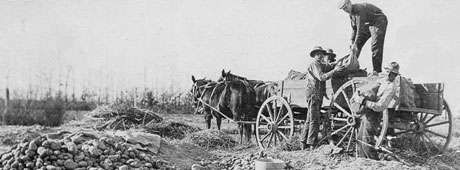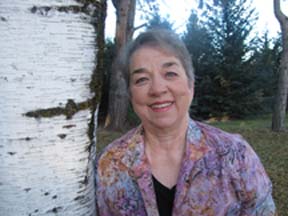No products in the cart.
Riverside–Spotlight

West of the Wild Snake
By Geraldine Mathias
Idaho was still a territory when Emory LaRocque and Homer LaLiberty and their families crossed the Snake River in 1884 at the ferry near what would become the city of Blackfoot. They settled their families along the freight road west of the river in a place later known as Riverside, five miles from Blackfoot, the first homesteaders in that area. Initially, it couldn’t have been easy for LaRocque and LaLiberty, miners of French Canadian descent with genteel manners. The LaLibertys moved on shortly, but the LaRocques stayed and must have been miserable in the mud and log dugout that was their abode while building their home across the road.
They had three children, and three more were born while they lived in the dugout. But LaRocque made considerable money working in Idaho’s Lost River area as a miner, and they soon were able to begin construction of their new home, which still stands nearly 130 years later. For its time and the area, it was rather grandiose. Yellow bricks were delivered by wagon from Salt Lake City for half of the two-story house, and it was quite a feat to raft them across the river, because the ferry was too light to carry them. The other half of the bricks was kilned locally. The LaRocques could not have imagined the changes that their home would undergo in the late 1980s, when it was purchased by the Mackley family, who still occupy it. They also could not have envisioned that eighty-two years in the future, a young couple would purchase a house a quarter-mile from theirs on ground that was part of their original homestead, less than a hundred yards from where their dugout once stood. That couple was my husband and I.
When we bought our home in Riverside forty-eight years ago, we were eager to get some land, raise our kids in wide-open spaces and grow some of our own food. Although our house was almost new, we did feel a little like pioneers, since we had four acres with mostly sagebrush and pasture grass, one cottonwood tree, and no lawn. And thanks to ancient channels of the Snake River, loads and loads of rocks.
But only recently have I come to understand how small our effort to tame our acreage was compared to the hardy folks who preceded us to settle Riverside in the late 1800s. Until then, the area was largely ignored by settlers and miners moving north, because the Snake River was wild and dangerous to cross at low water and impossible at other times. On the bottom were quicksand, rocks, and unpredictable potholes. The three main fords across the river were near the old Fort Hall, at Ferry Butte, and north of Idaho Falls near Menan.
This content is available for purchase. Please select from available options.
Purchase Only
Purchase Only

